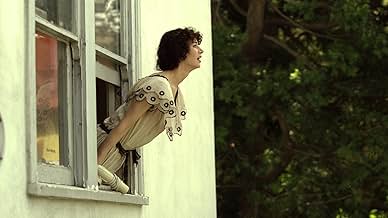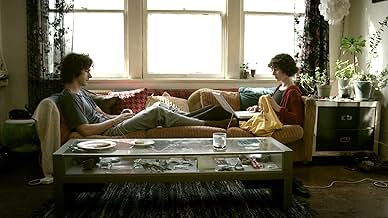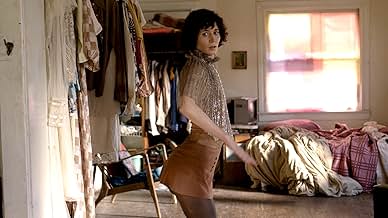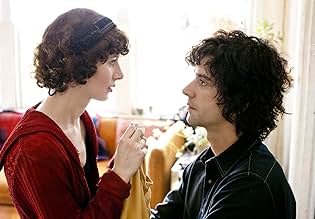Quando um casal decide adotar um gato de rua, sua perspectiva sobre a vida muda radicalmente, literalmente alterando o curso do tempo e do espaço e testando sua fé um no outro e em si mesmos... Ler tudoQuando um casal decide adotar um gato de rua, sua perspectiva sobre a vida muda radicalmente, literalmente alterando o curso do tempo e do espaço e testando sua fé um no outro e em si mesmos.Quando um casal decide adotar um gato de rua, sua perspectiva sobre a vida muda radicalmente, literalmente alterando o curso do tempo e do espaço e testando sua fé um no outro e em si mesmos.
- Prêmios
- 1 vitória e 7 indicações no total
- Neighbor Woman
- (as Diana Sandoval)
Avaliações em destaque
They lead a samey existence and reach a crossroads in their relationship. Just before this point they help an old stray cat, unsure whether they will be together to look after the cat the rest of its life they eventually decide they will adopt it and promise to return in 30 days.
Jason quits his job as a phone based IT support to educate the public of environmental issues disguised as tree selling. Sophie randomly find the telephone number of a man on the reverse of a painting and makes contact.
Jason finds an older guy who finds purpose in his life selling objects. Sophie discovers the restrictions of a suburban lifestyle.
Throughout this is the story of Paw Paw, the cat. A cat happy with his lot but then for the first time ever has discovered the human touch. Paw Paw is careful not to show too much to the humans but inside is ready for this move, indeed it seems it has been waiting it's whole life for someone to pick it up and want to care, and play and love this cat.
The story revolves around a couple that proposes a change in your life. They hate their jobs and the idea of adopting a cat makes it arise a new way of life. However what is proposed as a change eventually becomes routine. The fear of failure and responsibility makes the personality of both becomes complicated and often result surreal. The time is always the reason for the changes. The fear of an uncertain future and nonconformity with the present makes it parodies on numerous occasions the fact of stop the time. Specifically, the period in which Sophie and Jason are prepared to adopt a cat is the time when the personality of both becomes strange. There are surreal elements and nonsense conversations that show complex emotional states. The failure in work and routine makes Sophie feel prisoner to her feelings. The figure of Sophie has no splendor. It is a figure off and apparently weak. Her look is sad and never denotes happiness. In the same way the character of Jason is strange. He is the partner of Sophie and lives with her in a small flat and messy. His way of understanding things is similar to Sophie. Both fear the passage of time and want to be free. Marshall's character represents the freedom for Sophie. The way in which both are known is strange and simultaneously comic. Sophie looks out the window screaming and tries to listen to Marshall. The scene reflects a comparison: Sophie appears as imprisoned in her own home and as the only escape she has the window that looks out for help. The fact that the cat, paw paw, has a voice allowed to know their feelings and desires. The image is of an animal that is locked behind bars waiting for a change in his life, hoping in this case to be adopted. The comparison is similar to Sophie. Both are locked and desire freedom. The passing of time is also reflected in this character and appear feelings like frustration or even desperation to be adopted.
It's a surreal and complex film. The argument at first is easy but when the acts are performed we can see each character's feelings. We can see a lot of nonsense and abstract scenes. Adopting a pet is just an excuse for the change. I would like to highlight the rhetorical conversations about the passing of time, old age or the future. Personally I find this film hard to understand. There are many situations that make no sense as the act of talking to the moon, giving life to a shirt or the fact stop time. I think film is not made to be enjoyed, but it raises very philosophical thoughts on life. The emotional charge of the characters leads to surreal situations and even extravagant. These situations, in my opinion, have more weight than the argument itself.
The cat only appears physically once at the movie, but it has much more importance than that. In fact, it is the narrator. It helps the audience to be put into context, and it sometimes gives sense to some parts of the film that seem to be incoherent. A part from having an important leading role, it will be the one to break out the whole action; the fact of having decided to adopt it will be the turning point of a story that, at first, seemed to be set in a calm atmosphere.
Some important aspects of life are tackled. For instance, the uncertainty of the future is clearly shown. We have to assume that that is the way it is, we are in control of it, but we are not able to know about it. So, life would not be all about wanting to know more about the future, but to be ready to face what comes next. If we stop to think about the future we do not have enough time to live the present. We spend our daily life worried about the future, and what if that future does not exist?
The entire film is enveloped in an enormous pessimism. The way in which the characters act makes us predict that there is no energy in them and they are likely to lose. Instead of taking into account the advantages that life can offer to them, they only see problems around. They even see the fact of taking care of an abandoned animal as a problem, when that should be taken as a satisfaction. That offers the audience the possibility to decide if that behavior is right for you or not; it is a film that would make people think. Furthermore, it is a movie that favors self-reflection. Although the development of the movie does not make the moral to become evident, one can use the film as the starting point of a personal thought with a clear moral: It does not really matter what will happen next, we have to enjoy the everyday and make the most of it.
Heartbreaking, absurd, surrealistic, twee and bizarre at the same time, The Future is a piece of independent cinema that cannot be overlooked just because of the presence of disturbing elements such as the talking cat (whose high-pitched, childish voice rumbling in the dark is a powerful beginning by the way). Miranda July, director, writer and star of the film, is not just "being weird for the sake of being weird", but uses fantastic and bizarre images and situations to talk about our biggest taboos: the frailty of love, the futility of dreams, the anxiety about the passage of time and the fear of death.
With their scruffy curls and their apathetic attitude towards life, Sophie and Jason seem to be the perfect couple. By seeing them lied down on the couch with their feet entangled, the spectator realizes that they felt really comfortable being together. The image of Jason peacefully sleeping over Sophie's chest (sweet for some, twee for others) is also a very faithful representation of true love, as well as Jason's attempt to stop time forever reflects very well how heartbreak feels. Miranda July said in an interview that she intended to describe: "the bittersweet vertigo of true love". Despite the audience does not doubt in the sincerity and profundity of the feelings of the couple, it is forced to see how circumstances and human weakness makes their love begin falling apart.
Firstly, to understand why they (as us ourselves) start panicking when the words "a 5 years commitment" are brought up, it is necessary to come back to the kitten wounded in her paw. Like Paw-Paw, who patiently waits for the couple to start his real life (she's even counting the days), we are always waiting for something good to happen, for the real beginning of our lives. And when we reach the thirties, we start to question ourselves if that beginning is not already gone, get depressed for having wasted the first half of our life and look at the future even more anxiously than before.
This is more or less what happens to Sophie and Jason, whom the idea of looking after a kitten -requiring a total care- for the next five years of their lives, make them think of their (scary) future: "We're 35 now ... by the time the cat dies, we'll be 40 ... and 40 might as well be 50 ... and after that, spare change." "Spare change?" "Less than a dollar-- not enough to get anything you want " Jason's words reflect our anxiety about the passage of time as we cannot help feeling frustrated when the years pass by without us having reached the milestones we set for ourselves. Nonetheless in the film July, who said of life "I rush through it, like I'm being chased", warns us about the dangers that this feeling of "being always late" (late to live?) provokes. The Future not only make us consider how useless is to be always projecting into when it's going to be "better", but also make us question the importance of our lifetime dreams. It kind of helps us to get rid of the endless frustration caused by the contrast between our high expectations and our day-to-day reality. Like Sophie and Jason, everyone suffers from the Cervantine conflict, that is to say, the conflict between the world as we have imagined it and the world as it is. The story of Sophie and Jason somehow questions the futility of dreams, often unattainable and absurd (remembering Jason's: "I always thought I'd be a world leader").
How is it possible we cannot live happily just because we have not achieved some pretentious (generally childish) life goals? The Future, although has not the answer to the question, teaches us to open our eyes to our own limitations and stop feeling as if we deserved something better in life so as to start really enjoying ours. Life is not about waiting things to happen, but making things happen, as July said in No One Belongs Here More Than You: "Don't wait to be sure. Move, move, move"
July says that she intended to describe "the bittersweet vertigo of true love". Here an intense fear (vertigo) is intimately linked to an intense love, as imagining spending a whole life with someone is scary because from the beginning everyone already knows how the story ends, one dying in the arms of the other. Hence marriage makes you inevitably realize your own mortality and finiteness.
Some optimism is hidden, nevertheless, behind the pessimistic tone of the film. No matter what happens we always have to remember the enigmatic words of Joe Putterlik played by Joe Putterlik himself, an eccentric old man who Miranda met in a street market. This old man who participated in the film shortly before dying, tell us with his example that until you are dead, never is too late to live. So remember: "This is just the beginning".
"Life is not about waiting for the storm to pass, it is about learning to dance in the rain"
Anonymous
"Cold comedy" is a term I just made up to describe the way they make me feel. They make me laugh, but I also feel an uneasy chill up my spine. Maybe it's because the underlying story is somewhat cynical, with a chilly, brooding philosophy of life. But these films manage to poke fun of this hopeless condition in a way that tickles your funny bone.
I preface this review with a warning. As often, whoever wrote the DVD packaging is an idiot. This is definitely NOT a "whimsical romantic comedy" or whatever they advertise. So if you're expecting something cute & fun like "When Harry Met Sally", you might want to move on. Instead, what we get is a very, VERY oddball farce centered around a young clueless couple. If you liked "(500) Days of Summer" which, itself, is prefaced with the narration "This is not a love story", then keep reading because you'll probably like this movie too.
If you're an animal lover, particularly someone who has rescued a dog or cat from the local pound, you'll be drawn in instantly. The story begins through the eyes of a stray cat "Paw Paw" in a shelter, nervously waiting to be adopted by the couple before time runs out. The voice of the cat becomes the voice of wisdom throughout the film. I've never seen a film that takes such a thoughtful & innocent approach as through the eyes of a raggedy, injured cat waiting at the pound.
The first half of the movie is so bizarrely funny, with such unique characters living in their private bizarre bubble, it feels something like "Bill & Ted's Excellent Adventure". But now imagine "Bill & Ted" if it were directed by French New Wave filmmaker Jean-Luc Godard. Starting to get the picture...? In the director's commentary on the DVD, writer/director/star Miranda July calls this a very "still" movie. There are long breaks between characters speaking. There is a lot of silence, allowing us to soak in the depth of the moment. She jokes about one scene where the leading man dramatically rips off his headphones, and she calls it the big action scene, the equivalent of a car crash in this movie. Haha.
The slow, deadpan delivery makes the humor even more pervasive. I laughed out loud several times in the first half. But midway through the movie, the mood shifts suddenly and drastically. The remaining half is no longer a comedy but more like a soul-searching philosophical adventure. At first I hated the unexpected change (as the title of this review implies) because I was really enjoying the oddball comedy.
But, as the recurring theme of the movie implies, "the beginning" is only temporary. Life changes drastically. Love changes drastically. The plot, theme and mood of the film illustrate this perfectly. I can't say much more without ruining the story, so just be ready for anything. Ride this crazy roller-coaster to the end.
The acting and particularly the casting is flawless. The chemistry between the two leads, Sophie (Miranda July) and Jason (Hamish Linklater) is so perfect you'd think they're soulmates in real life. Another excellent piece of casting is Joe Putterlik who plays the old man. He is NOT an actor! Miranda found him while answering an ad in the Pennysaver classifieds, and she was so taken by his authenticity that she cast him in the role.
Another thing I really enjoyed was the great use of symbolism. You have to pay close attention, or even see the movie twice like I did, to catch most of it. Especially in the 2nd half when things become very poetic and sublime, you have to be on your toes.
If you like surreal comedy, like the films I mentioned earlier, films by Spike Jonze, Charlie Kaufman, Michel Gondry ("Eternal Sunshine of the Spotless Mind", "The Science of Sleep"), the early Johnny Depp flick "Arizona Dream", the Paul Giamatti comedy "Cold Souls", or maybe even the grandfather of modern surreal comedy "Catch 22", don't hesitate to see this movie. See them all. Whenever I stumble on a film like this, I'm reminded that cinema is a true art form.
Você sabia?
- CuriosidadesThis started life as a performance piece for Miranda July which she expanded into a feature film.
- Citações
Jason: You know how, like in cartoons, when the building gets hit by the wrecking ball, right before the building falls down, there's always like this moment where it's perfectly still right before it collapses? We're in that moment. The wrecking ball has already hit all of this, and this is just the moment before it all falls down.
- ConexõesEdited into 365 days, also known as a Year (2019)
- Trilhas sonorasSticky Buns
Written by Ryeland Allison
Performed by Ryeland Allison
[Courtesy of Silver Outlet Music America]
Principais escolhas
- How long is The Future?Fornecido pela Alexa
Detalhes
Bilheteria
- Orçamento
- US$ 1.000.000 (estimativa)
- Faturamento bruto nos EUA e Canadá
- US$ 568.662
- Fim de semana de estreia nos EUA e Canadá
- US$ 27.137
- 31 de jul. de 2011
- Faturamento bruto mundial
- US$ 887.172
- Tempo de duração1 hora 31 minutos
- Cor
- Mixagem de som
- Proporção
- 1.85 : 1




































